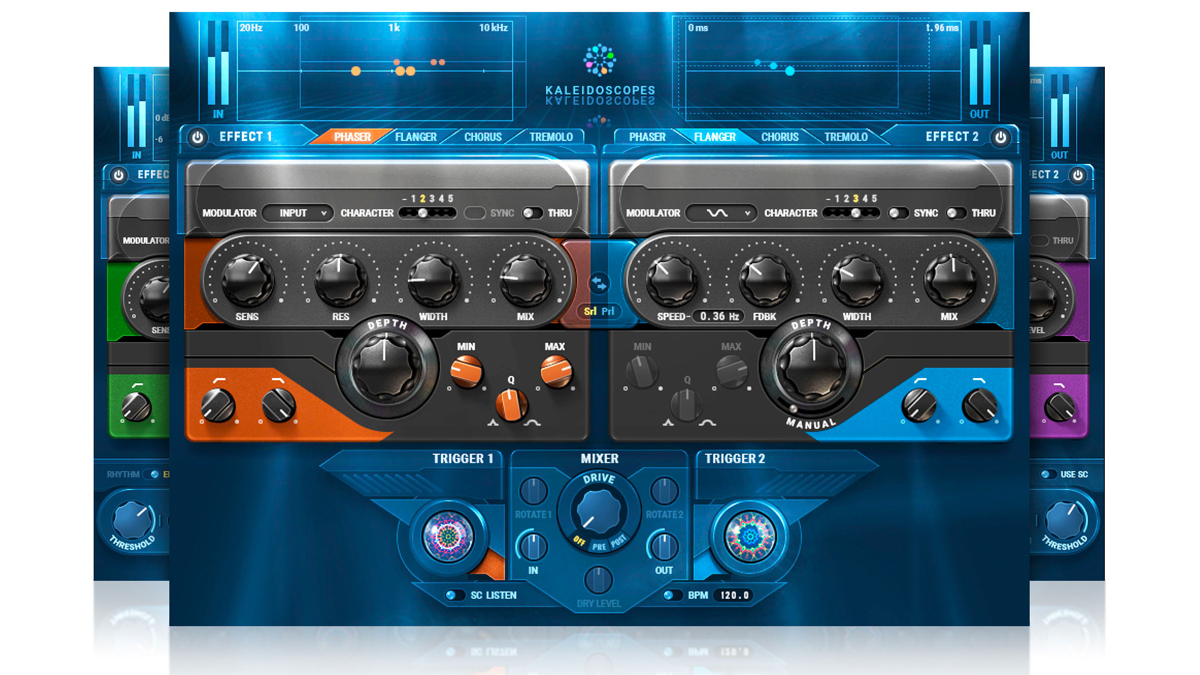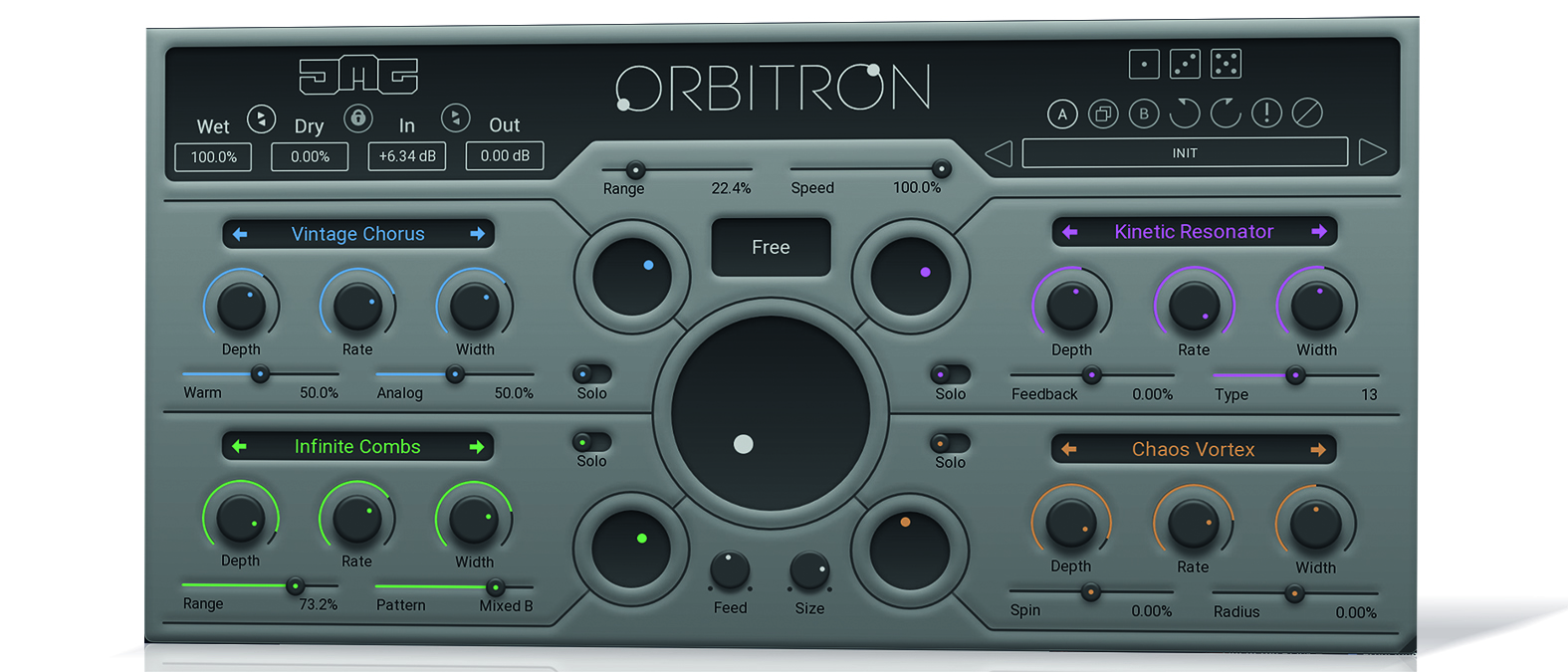MusicRadar Verdict
Its unique concept shows that clever effect blending can yield far richer sonics than traditional modulation approaches .
Pros
- +
A fresh concept that presents a fun re-think of effects programming.
- +
High quality transformative effects.
- +
Randomisation can often result in astonishing new directions.
Cons
- -
Quite pricey.
- -
Requires time to understand.
MusicRadar's got your back
What is it?
Re-thinking staid ways of working can lead you down unusual creative routes. The usual approach to shaping softsynth sounds with modulation effects, say, involves stacking or chaining said effects, with occasional automation bringing in certain modulations at key points.
While an established approach, JMG and United Plugins’ Orbitron plays with an entirely other dimension: sounds – and modulation effects – quite literally, orbit each other. Your audio track is visualised at the centre of the plugin’s UI, as a small white dot within a larger X/Y circle. This white dot moves in a circular motion between four different modulators, each of which can be assigned to 12 different in-built FX types.
The result is a strikingly organic sound that can repeatedly transition between shimmering chorus, ear-teasing phaser, frequency-chewing chaos or space-age resonators. Even the most mundane of tones can become something new entirely.
Say you want a revolution?
Though at its heart Orbitron is an effects plugin, it’s the novel ‘orbiting’ concept that is really taking dry tones to a new level. While other effects plugins typically allow for simple routing of modules, Orbitron’s always-moving conceit means that the end result is never settled, blending numerous effects to craft hybrid sonics we’d never normally stumble upon.
The default approach with Orbitron, is to tempo-match the orbit, so that its effect-cycles sit better within an existing track. This works well, though that’s not the only option. Randomisation functionality leads to more unpredictable flavours, while a manual mode equips us to fine tune, and lock, bespoke effect blends.
It’s also possible of course to override the entire orbiting concept, and simply use any of the (pretty top tier) effects individually. Playing with the three dice icons in the top right of the UI generates more unpredictable changes to your setup.
Performance and verdict
Onto the effects themselves, which are largely superb. Amongst the usual effect suspects, you'll find Infinite Combs, which can conjure an animated infinite rise and decline of pitch, Kinetic Resonator and Chaos Vortex, whose names describe what they do pretty succinctly, while Space Time is a particularly cool audio-mangler, feeding in a series of quirky, sci-fi-sounding delay lines.
Want all the hottest music and gear news, reviews, deals, features and more, direct to your inbox? Sign up here.
Each of the FX quadrants is equipped with Depth, Rate and Width knobs, as well as bespoke sliders which vary depending on the effect selected, for specific adjustments. Each also has its own X/Y circle, if you want to set amount-defining orbits per-effect.
As with any plugin that promises infinite possibilities, the end results are hugely variable, though by and large, each effect-soaked sound, from synth sounds and guitar lines to off-the-wall vocal performances, feels immediately more ‘alive’ as the audio makes its gradual rounds between the quadrants.
On a technical level, CPU-lag isn’t detectable, even considering that, when bypassed, the effects remain in sync with each other (with the software keeping a clever eye on performance drain).

• Waves Kaleidoscopes
All manner of versatile modulations effects can be easily chained, for blended, colourful sonics
• MeldaProduction MMorph
Lets you morph between two sound sources, with similarly organic-sounding end results
To get a handle on just how massively impactful Orbitron can be, cycling through the series of effect and orbit-presets lays bare several characterful aural cocktails. Crafted by a party of producers and sound designers, these presets are carefully assigned to categories that describe how they’re made.
Solo consists of presets that use just one FX section (if you just need to use a simple chorus or phaser for instance). Using this type of preset disables the other FX sections to free up CPU. Multi has up to four FX sections of the same type to provide more lush, organic versions of these effects. Hybrid, as the name implies, jumbles up often quite different effect types which can result in some unpredictable – but often mind-blowing – textures.
Getting used to Orbitron’s concept may take time, and for some effect combinations it just doesn’t work, but this is an otherwise wonderfully idiosyncratic piece of software, that breathes fresh life into your sounds
MusicRadar verdict: Its unique concept shows that clever effect blending can yield far richer sonics than traditional modulation approaches.
The web says
"At the heart of Orbitron is a great idea, and it’s been well executed. The constantly modulating modulations that it creates are successful at breaking the monotony of garden-variety modulation effects, and morphing between settings is smooth and transparent.."
MusicTech
Hands-on demos
UDi Audio

White Noise Studio
Plugin Boutique
Specifications
- Four FX sections
- 12 FX modes including choruses, flangers, phaser, special filters and more
- Unique circular feedback network
- Smart randomisation
- 64-bit audio quality at any sampling rate
- AAX, AU, VST, and VST3 compatible
- Required: Windows 8/10 (32-bit or 64-bit) Intel/AMD processor with SSE2 support or MacOS (10.10 and newer, 64-bit) Intel/AMD/M1 processor with SSE2 support
- Contact: United Plugins
Computer Music magazine is the world’s best selling publication dedicated solely to making great music with your Mac or PC computer. Each issue it brings its lucky readers the best in cutting-edge tutorials, need-to-know, expert software reviews and even all the tools you actually need to make great music today, courtesy of our legendary CM Plugin Suite.



